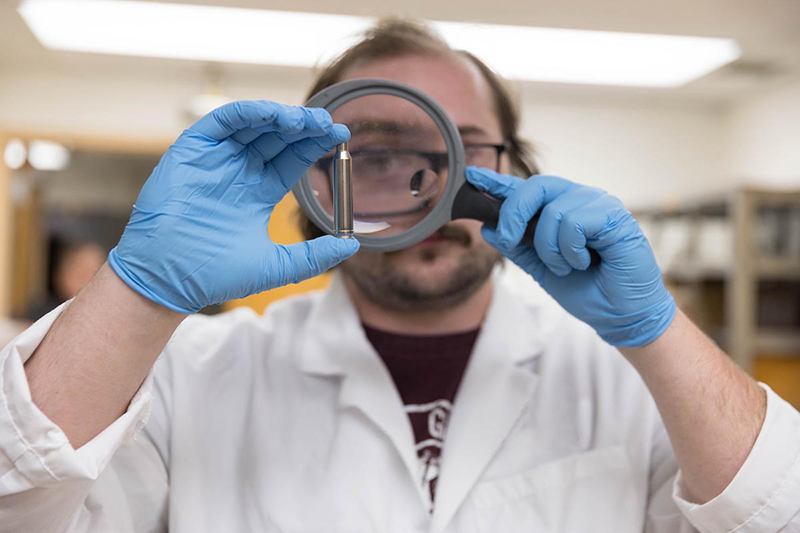
Connor Hazzard, fourth-year Purdue Northwest physical sciences student, examines a shell casing for tool marks as part of a capstone research project. Hazzard and other students learning under Charles Steele, lecturer of physical science and forensic science coordinator at Purdue Northwest, receive hands-on experiences to use innovative technologies in forensic science research and application. (Purdue University Northwest photo)
CBF Forensics is the first forensic and education company to sell products based on Purdue University Northwest innovations
HAMMOND, Ind. – CBF Forensics, a northwest Indiana forensic and education startup, has launched two new products: virtual reality (VR) programming for forensic crime scene training and a system to quantify the amount of THC in manufactured CBD and hemp products.
Crime by the F.I.V.E.S.
Crime by the F.I.V.E.S. provides training scenarios that simulate live scenes using VR technology.
 Charles Steele
Charles Steele Charles Steele is the founder and president of CBF Forensics. He said the Crime by the F.I.V.E.S. VR crime scene training program brings the latest technology and methods to forensic science classrooms and law enforcement agencies, providing affordable and standardized training.
"Crime scene investigation training is inconsistent across the country; there is currently no national standard. Most initial training takes the form of mock crime scenes that are not governed by global standards or requirements," said Steele, who also is a lecturer of forensic science and the forensic science coordinator at Purdue University Northwest (PNW). "The professional training that does exist is out of the economic range for most law enforcement agencies and is completely unavailable for most educational institutions.
"In addition, it is common for agencies to become entrenched in existing methods and not be aware of the latest technology," Steele said. "As a result, practitioners and new students often learn and use outdated methods."
The Crime by the F.I.V.E.S. VR training program connects to in-person, real-world laboratory exercises that can be used to fill out a full semester course.
"This educational approach allows the latest methods to be economically passed on to the general practitioner," Steele said. "Where possible, CBF Forensics will provide the latest support chemistry and devices to complement these scenarios."
Crime by the F.I.V.E.S. will be accessible through school and private learning management systems. Steele said it improves upon other VR crime scene training tools on the market by providing better features and functionality.
"The simulations follow real physics; if a user bumps into an item, it will move and possibly corrupt the crime scene. The visibility of evidence matches real-world optics," Steele said. "Crime by the F.I.V.E.S. is just the first in what will be a series of crime scene training scenarios. The original program was built by CIVS, the Center for Innovation through Visualization and Simulation, at PNW. CIVS is a leader in the simulation field, and our relationship will allow CBF Forensics to continue to produce the highest-quality products."
Along with Crime by the F.I.V.E.S., CBF Forensics will offer additional forensics products for fingerprinting and blood detection applications. Steele said those products will be launched later in 2023.
QuanTHC
CBF Forensics also has created QuanTHC, a system that enables CBD and hemp manufacturers to measure the amount of THC, or tetrahydrocannabinol, in their products. THC is the main psychoactive compound in marijuana.
Steele said CBD products must be free of THC, and hemp products cannot be above certain THC levels. He said up to 70% of CBD products sold in northwest Indiana contain THC, and hemp products are not monitored, which puts manufacturers and consumers at risk of legal and financial consequences.
"Innocently purchased hemp products may violate local laws," Steele said. "Users of CBD products may face criminal charges for having THC in their blood and lose their jobs and military careers, etc. The manufacturers face civil liability for the harm done to their customers."
Steele said most boutique manufacturers have no viable way to test the quantity of THC in their CBD and hemp products.
"QuanTHC provides an easy-to-use quantification test that does not require expensive analytical equipment or extensive chemical training," Steele said. "It offers accurate quantification levels, which improves upon traditional tests that have only yes-no indicators."
By 2024, CBF Forensics will pair QuanTHC with a benchtop neutralizer that disposes of all the test chemicals used in the quantifications.
A marketing video about Crime by the F.I.V.E.S. and QuanTHC is available on YouTube.
A historic startup
CBF Forensics licenses its technologies, developed by Steele and collaborators, through the Purdue Innovates Office of Technology Commercialization. CBF Forensics is the first startup launched from Purdue Northwest through the Purdue Innovates office. Purdue University Northwest, serving northwest Indiana, offers more than 70 bachelor's, master's and doctoral degree programs to nearly 9,000 students.
CBF Forensics has received support from PNW's College of Engineering and Sciences and the Center for Innovation through Visualization and Simulation, student research groups at Purdue Northwest's chemistry and physics department, and student Capstone Plus teams at the Purdue Polytechnic Institute at the West Lafayette campus.
"These student teams are a valuable resource," Steele said. "Startup companies like ours do not have the resources of a fully staffed R&D laboratory."
Steele is especially grateful to Kenneth C. (Chris) Holford, Purdue Northwest's provost and vice chancellor for academic affairs, whose office provided the initial funding to bring the forensic research at PNW and state-of-the-art VR training at CIVS together.
"The launch of CBF Forensics highlights the impact that Purdue Northwest can have in working with entrepreneurs to advance research that leads toward product commercialization," Holford said. "I believe that commercialization of research products in partnership with the university through entities like the new PNW Impact Lab will play an increasingly important role in future regional economic development."
CBF Forensics also received support from Purdue's Technical Assistance Program, or TAP40, and Purdue's Manufacturing Extension Partnership. Steele said he is grateful to have worked with the people and university resources.
"Going through the process of starting the company, we have worked with dozens of students and faculty across three campuses within the Purdue system," Steele said. "We have also worked with business and science professionals through Purdue Research Foundation and the University of Illinois Chicago's forensic science program. We are excited to be open for business."
About CBF Forensics






